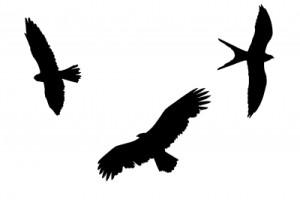(Image courtesy of Gualberto107 at FreeDigitalPhotos.net)
I never really paid much attention to birds until I met and married my wife Lisa. She is — and there is no other way to put it — obsessed with birds. We have hard drives figuratively bursting at the seams (and backed up, of course) with photographs of grackles, canaries, yellow whatever’s, and red these or those. While I have been observing her interest, and the subject of same, the area in which we live has experienced a marked increase in the presence of hawks. The reason doesn’t take an understanding of the nuts and bolts of nuclear propulsion to understand. We have what I will politely call more than our fair share of Canadian geese in our locale (which is not, I hasten to add, in Canada). The eggs of Canadian geese are considered by hawks to be a delicacy, in the same way that I regard the presence of a Tim Horton’s, Sonic, IHOP, or Cracker Barrel. The attitude of a hawk toward a goose egg could best be summed up by the statement, “If you lay it, I will come.” Or something like that.
Hawks will of course eat other things as well, and I’ve had opportunity to see them in the act of catch-and-not-release prey on a number of occasions. What they do is fairly highly evolved. If they catch a ground animal, they immediately take it into the air, where it is helpless and cannot run away. If they catch a bird, they bring it to ground, where it is at a disadvantage, and pin it so that it cannot fly away, while they kill it. One could say that a hawk is at a disadvantage on the ground, but I haven’t noticed squirrels, chipmunks, cats, or even other birds coming to the aid of one of their fellow and less fortunate creatures as the hawk goes about its business. No, things get really quiet for a while as the hawk exploits the weakness of its dinner.
Successful genre fiction utilizes the exploitation of strengths and weakness to succeed as well. This is particularly true when the author takes a personality trait that might, and indeed would, be considered a virtue and exploits it. We have a real world model for that, as well. Think of Ted Bundy. Those of us who are raised to be kind and polite and to assist others in need instinctively hold a door for the elderly or the infirm or pull down a top shelf grocery item for someone in a wheelchair. Bundy knew this and would wear a cast or walk on crutches while carrying a package to attract unsuspecting women. There’s a word for that: monster. But he was very, very good at it, and turned a virtue into a fatal weakness. Those who prey on children frequently do so with the premise of seeking assistance with locating a lost dog. What could be more heartwarming than reuniting a dog lover with his pet? Children are inclined to help, especially when it comes to dogs and such, and it’s a virtue that a parent would want to cultivate, but also to curb.
In the world of fiction, however, exploiting weaknesses of this type makes for a great story, and not just for mysteries or thrillers, either. Many science fiction novels and stories sprung from a seed of an advanced civilization bringing advancement to a primitive, or weaker, one with the best of intentions. Disaster inevitably ensued, for one side, or the other, or both. James Tiptree, Jr., was a master of this type of situation, as was the original Star Trek series. Romance novels? Think of a woman who is physically attractive to the extent that no one will approach her, out of fear of rejection. That idea has launched a thousand books and will undoubtedly launch a thousand more before this sentence is completed. As for mysteries and thrillers, the possibilities are endless and replicable: think of a strength, or a virtue, and find a weak spot to exploit. Create an antagonist to probe it and you’re on your way.
Patricia Highsmith’s Ripley comes to my mind most immediately as someone who was excellent at exploiting the best of others. Who comes to yours?
And…I would be remiss if I did not wish a Happy Mother’s Day tomorrow to those among our readers who celebrate the event . Bless you. You are the best.

